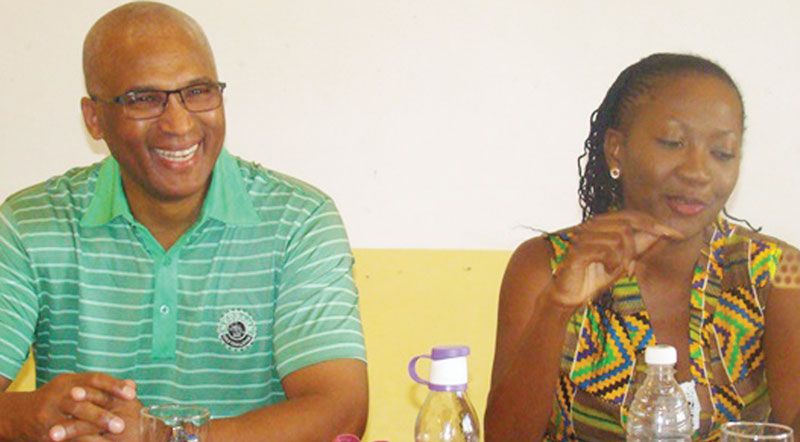
Contractors hold urgent discussion with African Development Bank not to exclude local companies

At the end of March, representatives of the Construction Industries Federation of Namibia (CIF) had a meeting with an African Development Bank delegation to discuss tender requirements on major instrastructure works that are drafted in such a way that Namibian contractors are excluded from submitting tenders.
The meeting took place in preparation for an upcoming public tender for the upgrade of the railway line between Kranzberg near Usakos, and Tsumeb in the central north. The meeting intended to raise awarness among international financial institutions about the importance of supporting local contractors when it comes to large projects, and not to prevent them from sharing in the work.
Using the tender for the upgrade of the railway line between Karibib and Walvis Bay in 2018 as an example, the Chief Executive of the Federation, Ms Bärbel Kirchner, said “prequalification requirements of previous projects financed by the AfDB had left Namibian-owned contractors excluded.”
“Namibian contractors were not allowed to tender for prequalification. This was due to the fact that especially the financial criteria were too steep, and that the criteria considering the value of previous projects completed, was also unrealistically high. The contract was awarded to China Gezhouba Group Corporation which largely had subcontracted the work to DMRail. Indeed, the situation was similar with the road project between Windhoek and the Hosea Kutako International Airport which had been awarded to a foreign contractor (Avic).”
“It was not possible for local Namibian contractors to meet the turnover and cash flow requirements, despite having had the right technical skills. Also the requirements were not necessarily project specific. The industry was indeed very disappointed as it would have been an opportunity to partially revive the construction sector. Currently, the industry finds itself very much in the same position as in 2018,” she continued.
The award of contracts to foreign contractors needs to be considered in the following context. The construction sector went through a recessions since 2016, which has led to many closures and bankruptcies of construction businesses. In 2015, the contribution of construction was 7.2% to GDP. This has now changed to less than 2% of Namibia’s GDP. The consequence is that many employees had to be retrenched and close to 50% of those engaged in the construction sector, had lost their job.
This also has meant that workers and professionals were retrenched; and many professionals have left the country with the consequential brain drain and related opportunity cost.
Considering the Namibian government’s current debt to GDP ratio and therefore a reduction of infrastructure development; as well as the need for grant or loan financing, it is not only vitally important that local majority Namibian-owned businesses get the maximum share of the projects but also that appropriate opportunities are created that will enhance the government revenue base. This can be achieved by corporate and individual tax contributions, as well as taxes on trade and taxes on consumption. This is very unlikely if the railway rehabilitation project is again awarded to a foreign contractor.
“Despite existing procurement policies and laws of the African Development Bank, it is vital that every effort is made to engage local majority Namibia-owned businesses, as loans will also have to be paid back with income mostly generated by the government by taxing its people, irrespective of the type of taxes,” stated Kirchner.
“It is important that tender requirements are such that they can meet both the AfDB policy and legal requirements, and hat they are aligned with the reality of the Namibian economy and construction sector,” she said.
“This could mean that the rehabilitation of railway line project between Kranzberg and Tsumeb will be divided into smaller lots. This would then allow majority Namibian-owned contractors to meet the financial prequalification requirements. Taking into consideration that the management of the project might become more demanding, the size of the lots should at least be small enough that two majority-Namibian owned contractors can tender together as a local joint venture.”
“It is critically important that every opportunity is sought to create employment and fair jobs. Construction is one of the sectors that allows for swift engagement with immediate impact.”
It was suggested that the AfDB would look at other African countries where the construction sector had faced similar predicaments and were potentially displaced by foreign contractors; and where the AfDB had packaged their projects accordingly, i.e. in line with the local capacity. Although it was stated by the AfDB procurement specialist that it was country specific, it was indeed affirmed, that larger projects were divided up into smaller projects.
This strategy is equally appropriate for the Namibian construction industry.











































